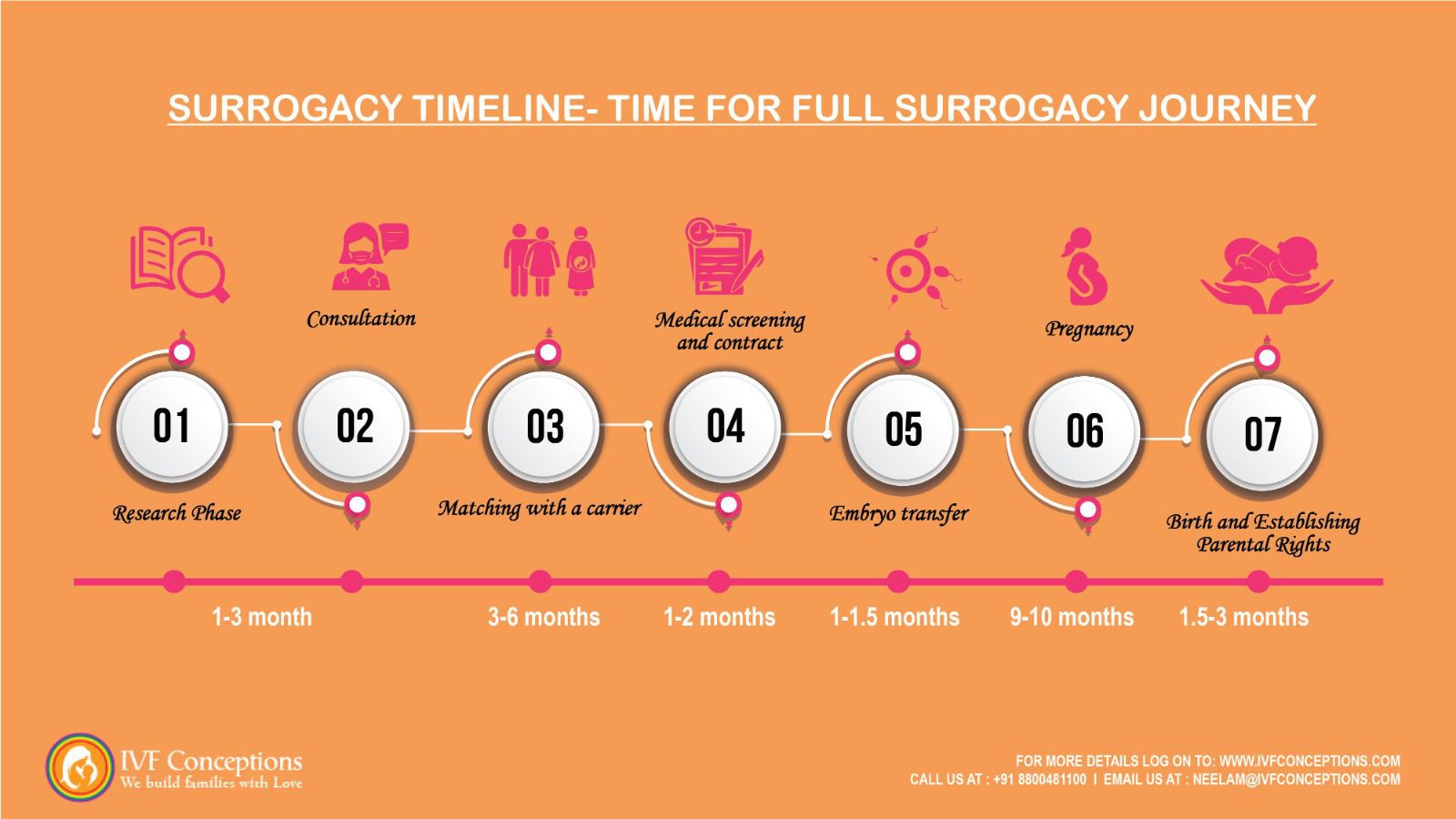Reasons to consider surrogacy by intended parents

Intended Parents choose surrogacy due to infertility issues, being unable to conceive even with medical help, and sometimes having life-threatening diseases that make it hard to carry the pregnancy to term. For single male or gay couples, it is the only method to have a biological baby.
For many, the dream of welcoming a child into their lives is a profound desire, one that can be hindered by physical obstacles or lifestyle choices.
However, the path to parenthood has evolved over the years, offering new opportunities and solutions. Surrogacy, particularly gestational surrogacy, has emerged as a transformative option, and IVF Conceptions is here to guide you through this remarkable journey.
Gestational surrogacy is sometimes the only solution or hope for couples who may not have kids due to medical reasons and women who have reached menopause. Besides this, surrogacy is a boon for gay couples or single males wishing to have their own babies.
Recent data reveals a substantial increase in gestational carrier cycles, from a mere 727 in 1999 to an astounding 3,432 by 2013. During this period, more than 18,400 infants were joyfully welcomed into the world through gestational surrogacy, a number that continues to rise. This surge in popularity can be attributed to several compelling reasons, which we at IVF Conceptions are eager to explore with you.
The United States has seen a shift toward surrogacy-friendly laws across various states, enhancing the safety and accessibility of gestational surrogacy for families.
This developing landscape has made it possible to have a baby of their own for those who are facing medical challenges and lifestyle obstacles that once hindered their path to parenthood.
Begin your surrogacy journey with IVF Conceptions today!
Mobile: +91-8800481100 ( WhatsApp, Line, Viber)
Email: neelam@ivfconceptions.com
Web: www.completesurrogacy.com
 Types of surrogacy agreements.
Types of surrogacy agreements.
There are basically 3 types of surrogacy –
- Gestational surrogacy – In gestational surrogacy, the surrogate does not use her own egg. The egg used belongs to the intended mother or an egg donor similarly, the sperm used belongs to the intended father or the sperm donor. The gestational carrier has no biological relationship with the child.
- Traditional surrogacy – In traditional surrogacy, the egg used to belong to the surrogate mother. Thus, she is biologically related to the child.
- Altruistic surrogacy – Altruistic surrogacy is like gestational surrogacy except for the fact that the surrogate is the relative of the intended parents. Also, no payment except for the coverage of the expenses is given in the altruistic surrogacy.
Why Intended Parents Choose Surrogacy?
Reasons to Consider Surrogacy are as follows;
Below are some compelling reasons why surrogacy becomes the chosen route for many intended parents:
-
Limited Success with In Vitro Fertilization (IVF) or Assisted Reproductive Technology (ART)
For those who have experienced repeated setbacks in their attempts to conceive through IVF or ART, surrogacy offers an alternative avenue toward achieving their dream of becoming parents. It provides renewed hope and a fresh start on their parenthood journey.
-
Uterine Health Challenges
Numerous medical issues can affect the health of the uterus, making it impossible for some individuals to carry a pregnancy to term. These issues include uterine shape abnormalities, septate uterus, uterine fibroids, uterine scars from infection or surgery, and more. Surrogacy emerges as a solution, ensuring that parenthood remains within reach.
-
Previous Surgeries or Hysterectomy
In cases where the uterus has been removed due to personal or medical reasons, surrogacy becomes a lifeline. It enables individuals to experience the joys of parenthood despite the absence of a uterus.
-
Unexplained Infertility
Sometimes, despite exhaustive efforts, conception remains elusive. Surrogacy serves as a beacon of hope for those who have tried conceiving for extended periods without success. It offers a fresh perspective on the path to parenthood.
-
Maternal Age
As maternal age advances, the risks associated with pregnancy increase. After the age of 35, individuals may face a higher likelihood of complications. Surrogacy offers a solution, ensuring a safer and healthier pregnancy for aspiring parents.
So gestational surrogacy is the best option in these cases for people who have crossed their age to be pregnant safely. To this end, the surrogate’s age specification is chosen between the ages of 21 to 39. For elderly females, using an egg donor is also a good option to increase the success rate of pregnancy.
-
High-Risk Pregnancy Conditions
Certain medical conditions, such as obesity, diabetes, heart or blood disorders, maternal age, or sexually transmitted diseases, may increase the risk of pregnancy complications. Surrogacy offers a safer and more viable option for individuals facing these challenges.
-
Post-Partum Depression
– Postpartum depression is a serious concern. It can lead to postpartum psychosis if not treated properly. Such problems are generally overlooked and not properly thought about.
But it’s important to highlight these issues in these situations. Unless, during her early pregnancy, the woman has suffered from severe depression, she may choose a surrogate for her next pregnancy. This bold move would help improve the woman’s quality of life and strengthen her ability to enjoy and bond with the new baby.
-
Uterine Problems
Some women have a uterus problem. This may be the result of a rare genetic malformation that affects one in every 12,000 people, or she may have her uterus removed due to some tumor infection.
The absence of the uterus destroys women’s chances of carrying the child. There may be some underlying disorder or a uterine defect less serious than the lack of a womb which makes the pregnancy difficult or in some cases makes it difficult for the infant to take it to the word. A malformation of the uterus sometimes has a small impact on conception. But a woman cannot carry the child to the word.
-
Medications
– Many situations may allow women to take the medicine that could create a problem during childbirth. Therefore, either these drugs must be stopped or abortion must be avoided.
When stopping the drug is not a choice in these situations, one should certainly go for surrogacy. In order to maintain the genetic link with the infant, you may choose gestational surrogacy. So, to build their family, these people can choose surrogacy.
-
Single man parents
– A woman doesn’t always tick the biological clock. Sometimes a man is willing to become a dad and doesn’t want to make it happen around a relationship with a woman.
Therefore, for those who want to build their family on their own terms, Gestational surrogacy is an essential choice. It is possible to seek the surrogacy agency’s support in further directing them to surrogacy procedures that will help them build their own families without any restrictions.
-
Same-Sex Couples
For same-sex couples, particularly male couples, surrogacy opens the door to building their own family. It provides an avenue for both partners to have a biological connection to their child, often with the assistance of an egg donor.
Learn more about –
Secure yet low-cost gay surrogacy.
Everything you need to know about the gay surrogacy process

How Does the Surrogacy Process Work?
The surrogacy process is a meticulously planned and coordinated journey:
- Matching: Intended parents are matched with a suitable surrogate mother, considering factors like compatibility, medical history, and personal preferences.
- Medical Procedures: Depending on the type of surrogacy chosen (gestational or traditional), medical procedures are conducted to create embryos using the genetic material of the intended parents or donors.
- Implantation: In gestational surrogacy, the embryo is implanted into the surrogate’s uterus. Traditional surrogacy involves artificial insemination, where the surrogate’s egg is fertilized by the intended father’s sperm.
- Pregnancy: The surrogate carries the pregnancy to full term, providing a safe and nurturing environment for the developing baby.
- Birth: The baby is delivered, and legal arrangements ensure that custody is transferred to the intended parents.
- Legal Formalities: Legal contracts are drafted and signed to establish the rights and responsibilities of all parties involved.
Conclusion
At IVF Conceptions, we are dedicated to making your surrogacy journey a reality. Our commitment to providing expert guidance, unwavering support, and the highest standards of care ensures that you embark on this life-changing journey with confidence.
If you’d like to learn more about IVF, Egg Donation, or surrogacy services globally, check out the rest of our website at IVF Conceptions.
Begin your surrogacy journey with IVF Conceptions today!
Mobile: +91-8800481100 ( WhatsApp, Line, Viber)
Email: neelam@ivfconceptions.com
Web: www.completesurrogacy.com
FAQs for Why Intended Parents Choose Surrogacy
Why should parents choose surrogacy?
Parents choose surrogacy when they face challenges with fertility, medical issues affecting pregnancy, or when same-sex couples want to have a biological child. Surrogacy provides an alternative path to parenthood, ensuring a safe and nurturing environment for the baby.
What to ask intended parents for surrogacy?
When considering surrogacy, intended parents should ask about the surrogate’s medical history, experience, and preferences. It’s essential to discuss expectations, legal arrangements, and the surrogacy agency’s services in detail.
What is an intended parent in surrogacy?
An intended parent is an individual or couple who wishes to have a child through surrogacy but faces challenges in carrying a pregnancy to term. They provide the genetic material or work with donors to create an embryo, which is then carried by a surrogate mother.
Why do actors choose surrogacy?
Actors, like others, may choose surrogacy for various reasons, including busy schedules, career demands, or medical factors. Surrogacy allows them to have a child while maintaining their work commitments, ensuring a secure and loving environment for their family.

 Types of surrogacy agreements.
Types of surrogacy agreements. 
